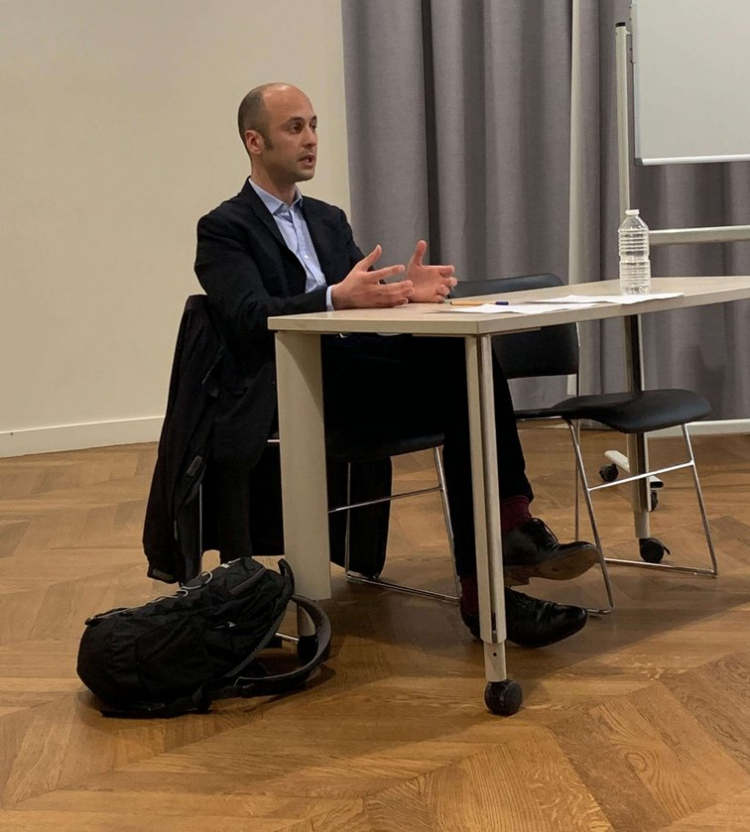Guest Scholar Discusses Anti-Semitism in France

Anti-Semitism has been a big topic in French news after a Parisian Jewish supermarket was set on fire in 2018 and recent vandalism to Jewish landmarks in Strasbourg and France. Similarly, the continuation in protests by members of the Gilets Jaunes who state that France is not a place for Jewish individuals. In his lecture on April 3, 2019, Science Po Professor and Notable Scholar, Samuel Ghiles-Meilhac, gave a brief history of the evolution of Jewish anti-semitism in France after the French Revolution until today. In addition, the guest speaker offered solutions on how to tackle the current anti-Semitism crisis in France.
France was Once the Champion for Jewish Rights
Jews have lived in France for a long time. France is undoubtedly, the European country with the largest Jewish population, with an estimated 500,000 Jews currently reside in France today.
The professor detailed France's precarious relationship with Jews, citing that there were good times and bad times. "At one point in time, France was considered the ideal place for Jews to live because they felt their rights were protected," he said. To explain his point, he brought up the crucial year of 1787, when France was the first European country to Emancipate their Jews collectively and grant them citizenship. Ghiles-Meilhac noted that later this emancipation marked a shift in the role of Jews in French society. "No longer are Jewish a nation within a nation. This signified to Jews that they will not be targeted for what they believe in or how they practice their religion," he said.
Similarly, he spoke about up the Intellectual Contest of 1787, by which the French government wanted to redefine what their new rights and roles and status should be and assessed how to make Jews more happier and useful of France.
Jews In a Fragile Situation
Despite such progress, many French continued to harbor resentment towards its Jewish populations. "Jews were still in a fragile situation. "Ghiles-Meilhac stated "One century after the 19th, free speech progress, you have these beliefs that are extremely strong against Jews, and that Jews are part of a dynamic that is destroying society, destroying what should be the natural and traditional foundations of society. "
It was these beliefs that soon led to violent atrocities against Jews. The most notable case of this was the Dreyfus affair, an innocent Jewish army officer was found guilty of espionage on the mere fact that he was Jewish. This trial brought up old resentment harbored towards Jews. The guest speaker states, " Here-in lied the assumption that it was impossible for Jews to be Fully French, they were dangerous for France". Rights for Jews saw another drastic diminish in World War 2, under the Vichy Regime, which not only excluded Jews from public life but also collaborated with Nazi Germany to deport 76.000 Jews to concentration camps.
Guest Speakers Explains Where We Are Now With Anti-Semitism in France
People say that society is a lot les anti-Semitic, at the same time during the Dreyfus Affair, no one killed Jews. This is not the case now, now we see French people killing other French people in France just because they are Jewish."- Samuel Ghiles-Meilhac
Now, according to reports, in 2018, Anti-Semitism in France had risen 74 %. Recent incidents included the word Jew that was written on the wall of a French bakery in the Marais, a historical Jewish quarter of Paris and vandalism to Jewish cemeteries in Strasbourg.
This is due to a variety of reasons such an uptake in violence, caused by dissatisfaction by the French government as well as the rise in Far Right Parties across Europe and France. Additionally, movements in France such the gilet jaunes, which attract individuals who are angry towards the French government and specifically French elites.
The professor was not ready to fully blame the Gilet Jaunes, of whom there are multiple different factions with seemingly different agendas. Instead, he blames the lack of reaction by bystanders and the public. "In L'affaire Dreyfus, the country was torn apart by those who defended Dreyfus "Le Dreyfusards", and by those who were against him," he said. Today, people are less reactive. If a Gilets Jaunes hurls insults towards Jews during a protest, people do not instantly condemn them. That is the problem we are experiencing today."
He also credits the use of social media to the rise of anti-semitism. Social media sites like Twitter and Facebook have platform individuals who share the same hateful and insidious rhetoric. "People can say whatever they want on Social media. Adults and individuals as well, and they use the excuse that it is freedom of speech, or that it is not a big deal," he explained. According to him, on a local level, there also lies a difficulty in training teachers and professors to understand how these social media apps work, so they can search for hateful and inflammatory commentary. He recommends for individuals to use websites like FARO, which reports on illegal activity including violent hate-speech. "It's important to teach them how to report cases. Anything illegal and takes place online it's important to report these. Others will start to think twice," he said. He also urges that on a European level, there needs to be a push to force Twitter and Facebook to take stronger measures against hate speech as they do now for terrorism.







